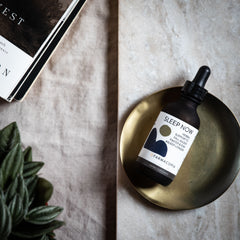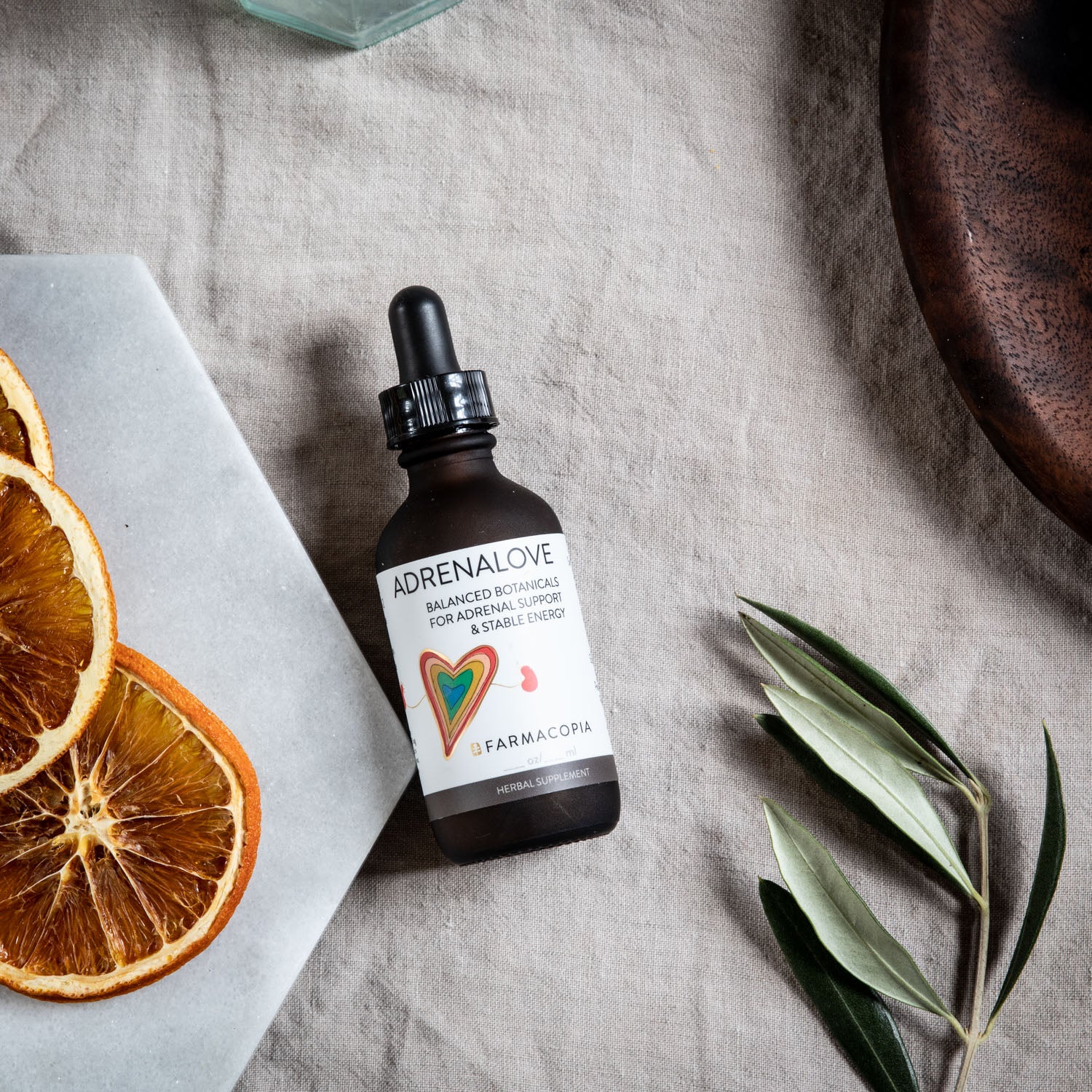
Author: Lily Mazzarella
Pick your winner:
“I fall asleep easily but wake up after 4 hours and can’t go back to sleep.”
“I wake up every night at (insert appropriate dreaded hour: 2 AM, 3 AM, 3:30 AM, 4 AM, 4:30 AM) and can’t fall back to sleep.”
“I wake up every 2 hours.”
“If I fall back to sleep, it’s at 6 AM, right before I’m supposed to wake up.”
“I’m EXHAUSTED but when my head hits the pillow I’m wide awake.”
Sleep problems drive a huge number of people into Farmacopia, and into my practice, leading me to a professional focus on insomnia and sleep restoration. It is also a subject with a special poignancy for me: since childhood, I have experienced each of these exquisitely frustrating scenarios. I know firsthand how spirit-crushing insomnia can be.
I also know how complex sleep is: it is an emergent phenomenon—that is, the product of many complex systems in our bodies. When we can’t sleep through the night, we understandably seek substances that will “knock us out” and “work.” However, I see again and again that sedatives, prescription (like Ambien or Valium) or natural (think Valerian or Kava), simply don’t cut it in this age of chronic high stress and complicated sleep disturbance.
Having trouble staying asleep, known as sleep maintenance insomnia, can be the result of nutrient deficiencies, inflammation, digestive imbalances, infection, metabolic disturbance, blood sugar imbalance, hormonal fluctuation, depression, apnea, restless legs, daytime stress and disturbed cortisol rhythms, as well a general cultural or constitutional tendency towards sympathetic dominance: having a nervous system kicked into high gear far too frequently. In some well-rested individuals, middle of the night waking can be the hallmark of a natural pattern called “segmented sleep,” but that’s another story.
As someone with fragile sleep, I am aware that when my life is particularly full or stressful my sleep is the first thing to go—which of course initiates a slippery slope of other things “going.” My practice is full of people living the results of sleep deprivation: stress resiliency drops, cognition and creativity suffer, energy slumps, cravings skyrocket, inflammation flares, immunity plummets, digestion grinds to a halt, and depression and anxiety spring forth. Sleep loss makes us loose cannons—more likely to crash our cars and yell at our loved ones, and it makes our bodies’ communication systems go haywire.
I also know I tend to lose sleep on certain days of my menstrual cycle, during full moons, and when I’m exposed to environmental mold. If I fall off my magnesium and methylated B vitamin regimen, forget it. Oh, and hard alcohol: I have to choose between a good night of sleep and a good Manhattan. One of the greatest benefits I experienced from stopping wheat consumption was improved sleep.
You get the idea: sleep is complicated.
Given this fundamental truth, here are some sleep essentials to help you evaluate your situation:
We need to be nourished to sleep: Sleep is actually a lot of work: it is an active brain state during which memories are consolidated, hormones and immune factors are manufactured, and organs and glands are repaired and recalibrated. It requires abundant minerals such as Magnesium, Calcium, Zinc, and Iron; vitamins such as C, D and the B family; healthy fats for cell membrane fluidity and neurotransmission, and protein for blood sugar stabilization. I’m a big fan of daily broth for better sleep.
We need to manage daytime stress to sleep: I observe a direct correlation between my clients’ daytime stress levels and their ability to achieve restful sleep at night. We wake in the wee hours to re-hash arguments we’ve never had, run through our to-do lists, worry about our teeth, the economy, and our children’s plight in the age of climate change. In addition to exercise, meditation, and therapy, herbal strategies can be employed to manage chronically high stress. Adaptogens and nervine therapy are safe herbal approaches that help offset the negative effects of stress. Farmacopia makes dozens of these personalized blends—contact us for more information. The Super Power adaptogen powder and In the Moment nervine tincture are a great start!
Inflammation bothers the brain: Inflammatory cytokines (immune messengers) travel to the brain and initiate the message: “everything is not okay.” The good news: we can positively influence our inflammation levels by changing our food supply, by eating more plants, and by taking certain nutrients and botanical medicines. One of the biggest pieces of feedback I receive from clients on anti-inflammatory diets is how much their sleep improves. Curcumin extract (see our Turmeric blog post), blueberries, green foods, and fish oil all help support healthy inflammation levels.
Blood sugar dips: Hypoglycemic wakings, caused by dips in blood sugar and a subsequent release of stress hormones—the main job of which are to raise our blood sugar–are very common. And, in a bitter twist of physiological fate, sleep deprivation actually causes blood sugar dysregulation: it contributes to the development of insulin resistance, high blood sugars, and sugar craving. Having a small nutrient-dense snack before bed (or upon waking) can help keep you from waking, or put you back to sleep. Working to balance blood sugar during the day is the BEST way to work with this pattern. Avoiding simple carbohydrates, and aiming for a protein source, healthy fat and vegetables at each meal, and eating low-glycemic fruit in the place of baked goods, cereals, and bananas is a good place to start.
Caffeine? Please?: Even if you’re not, genetically speaking, a slow metabolizer of caffeine, it could still be having a negative impact on your ability to achieve restful sleep. By tapping your “stress axis” (the hypothalamus-pituitary-adrenal axis), caffeine can set you up for adrenal dysregulation. That is, even if it’s out of your system, caffeine consumed early in the day can disturb your sleep by rattling your system with stress hormones and depleting your adrenal glands. If you have insomnia, and you do have a variation in the liver enzyme CYP1A2, which processes caffeine, you may need to give up it entirely, or ingest stimulants like coffee, tea, and chocolate well before noon. Sugar can have a similar stimulate-and-crash-out effect on the adrenals; cut it out altogether if you’re really depleted, or set 1 PM as a cut-off point.
Hormonal mayhem: Sleep disturbance during the second half, or luteal phase, of the menstrual cycle is very common and may be related to insufficient progesterone and/or estrogen dominance. Work with an herbalist, nutritionist, acupuncturist, ND, or holistic MD to look at ways of supporting healthy progesterone levels, and estrogen metabolism. Support your liver’s ability to process hormones with Milk Thistle, Schisandra, Dandelion Root, and 1-2 servings of cruciferous vegetables per day. Metabolized hormones are excreted via the bowel, so make sure you’re having a daily and complete bowel movement: flax seeds provide soothing fiber, and contain lignans that have been shown to positively influence estrogen metabolism by creating a favorable ratio of estrogen breakdown products. Some studies indicate that regular flax seed consumption can lengthen the luteal phase, suggesting an enhancing effect on progesterone production. Aim for about 1 TBSP per day.
Menopause: Menopause can take even the best sleepers by surprise. Sleep disturbance is one of the primary complaints I hear from menopausal women—and ranks as the most vexing for many. Fluctuating hormone levels, estrogen dominance, and estrogen withdrawal can all impact sleep—and of course, night time sweats/hotflashes don’t help. Some women are helped by bioidentical HRT, while others opt for plant-based solutions. I routinely make herbal blends featuring Black Cohosh, Jujube and Sage (among others) that help reduce hot flashes and improve sleep quality. Ask your herbalist what herbs are appropriate for you in your phase of transition.
Your gut will keep you awake: 9 messages up for every 1 message down: that’s the communication ratio between the gut and the brain. If the gut is unhappy, the central nervous system is the first to know about it. Reflux, food intolerance and allergy, inflammation from toxins and unfriendly organisms, yeast imbalance, late night food scavenging, and bloating can all negatively impact sleep. Embark on a gut healing regimen to see just how good it can feel to be GI-symptom-free—that’s what our New Year’s Cleanse is all about! Avoid spicy and stimulating foods in the evening, and if you suffer from reflux, aim to finish eating at least 3 hours before bedtime. To avoid late night food-seeking behavior, balance your blood sugar, stress hormones, and neurotransmitters by eating adequate fat, protein, and fiber throughout the day.
Here’s what you can do to get more sleep tonight:
 Skip this afternoon’s caffeine and carb fix, and opt for a mineral, fat, and protein-rich snack like ½ apple and almond butter, sliced turkey with avocado, or salmon salad rolled in nori sheet. This will help you avoid late night carb binging.
Skip this afternoon’s caffeine and carb fix, and opt for a mineral, fat, and protein-rich snack like ½ apple and almond butter, sliced turkey with avocado, or salmon salad rolled in nori sheet. This will help you avoid late night carb binging.
 Stop all screens at 7 PM, and sweep your bedroom for blue light. The blue light from illuminated screens signals “daytime” and makes us more alert. Using a tablet, iPhone, or computer in the evening can disrupt our circadian rhythms and suppresses the production of melatonin, our “sleep hormone,” in the pineal gland. Check your bedroom for ANY source of light—alarm clocks, etc, and cover them or switch them out (I used black electrical tape to cover the unnecessarily bright light that comes from my air purifier “on” button). There are fixes for this if you’re a late night screen user: the f.lux app, screen covers, and my favorite—orange eyeglasses that filter out the blue wavelength. If you do late night computer work, and you have sleep troubles, consider them essential. You can get red LED nightlights from bulletproof.com so you’re not exposed when you get up to pee or get a glass of water. As Steven Lockley, a sleep and circadian rhythm researcher at Harvard puts it: “The premise to remember is [that] all light after dusk is unnatural….All of us push our sleep later than we would if we didn’t have electric light.”
Stop all screens at 7 PM, and sweep your bedroom for blue light. The blue light from illuminated screens signals “daytime” and makes us more alert. Using a tablet, iPhone, or computer in the evening can disrupt our circadian rhythms and suppresses the production of melatonin, our “sleep hormone,” in the pineal gland. Check your bedroom for ANY source of light—alarm clocks, etc, and cover them or switch them out (I used black electrical tape to cover the unnecessarily bright light that comes from my air purifier “on” button). There are fixes for this if you’re a late night screen user: the f.lux app, screen covers, and my favorite—orange eyeglasses that filter out the blue wavelength. If you do late night computer work, and you have sleep troubles, consider them essential. You can get red LED nightlights from bulletproof.com so you’re not exposed when you get up to pee or get a glass of water. As Steven Lockley, a sleep and circadian rhythm researcher at Harvard puts it: “The premise to remember is [that] all light after dusk is unnatural….All of us push our sleep later than we would if we didn’t have electric light.”
 Get in the bath. Specifically, an Epsom salt bath with lavender essential oil. An overly hot bath can be stimulating, while a warm bath normalizes circulatory patterns in the body, and soothes the nervous system.
Get in the bath. Specifically, an Epsom salt bath with lavender essential oil. An overly hot bath can be stimulating, while a warm bath normalizes circulatory patterns in the body, and soothes the nervous system.

Sleep naked (or at least in a cold room). Temperature regulation is a surprisingly significant factor in each of the two types of insomnia—trouble falling asleep and staying asleep.
According to The American Academy of Sleep Medicine, your body temperature naturally declines as a part of your circadian rhythm as you sleep deeply.
According to Dr. Van den Heuvel, an Australian sleep researcher, “studies of sleep onset insomniacs show that they consistently have a warmer core body temperature immediately before initiating sleep, when compared with normal healthy adults.” This results, he says, in a state of heightened arousal—corresponding to higher cortisol levels—that prevents us from falling to sleep when we go to bed, as we wait for our bodies to lose the heat that’s keeping us awake. Studies on people with sleep maintenance insomnia often have rising and fluctuating body temps between the hours of 1-4 AM.
“We’re only talking about a half to one degree but that small temperature change can result in significant differences in arousal between insomniacs and people without sleeping problems,” Van den Heuvel says.
In order to drop our core temperature, the body needs to “act like a radiator” and perfuse heat out from the core to the periphery of the body; if our pajamas are too heavy, or made of synthetic material (same goes for bedding), we have trouble throwing off excess heat. Opt for 100% cotton and consider sleeping in the buff.
 Take a teaspoon of Natural Calm, a pleasant-tasting fizzy magnesium drink, in warm water in the evening. Magnesium is naturally relaxing, and together with B vitamins is essential for normal serotonin production. If Calm gives you loose stools, try Jigsaw Magnesium Malate, a sustained-release form that is extremely well-tolerated.
Take a teaspoon of Natural Calm, a pleasant-tasting fizzy magnesium drink, in warm water in the evening. Magnesium is naturally relaxing, and together with B vitamins is essential for normal serotonin production. If Calm gives you loose stools, try Jigsaw Magnesium Malate, a sustained-release form that is extremely well-tolerated.
 Get it off your mind: Before bed, write a list of anything that is bothering you, or queuing up in your mind as a to-do list. Acknowledge to yourself, and to the items on your list, that each will receive your full and proper attention in the light of day. For years I avoided this popular cognitive-behavorial tool. Wish I had started sooner.
Get it off your mind: Before bed, write a list of anything that is bothering you, or queuing up in your mind as a to-do list. Acknowledge to yourself, and to the items on your list, that each will receive your full and proper attention in the light of day. For years I avoided this popular cognitive-behavorial tool. Wish I had started sooner.
 Soothe yourself: Try 3 minutes of “follow-the-breath” meditation (This works pretty much just how it sounds: focus your mind on your inhalation, and on your exhalation. Notice where the breath lands in your body, and where it doesn’t. As your mind wanders, simply bring it back to the breath). Hypnosis has helped many of my clients who are too agitated to meditate, and nowadays is as accessible as your phone. Relax with these apps.
Soothe yourself: Try 3 minutes of “follow-the-breath” meditation (This works pretty much just how it sounds: focus your mind on your inhalation, and on your exhalation. Notice where the breath lands in your body, and where it doesn’t. As your mind wanders, simply bring it back to the breath). Hypnosis has helped many of my clients who are too agitated to meditate, and nowadays is as accessible as your phone. Relax with these apps.
 Sleepy supplementation:
Sleepy supplementation:
Did you know that plants make the hormone melatonin? I see in practice that this natural form is far better tolerated than synthetic forms, which is just about everything else on the market. Try 3 mg of plant-based melatonin (“Herbatonin,” available at Farmacopia) ½ hour before bed. Cherry is also a rich source of melatonin
 Sleepy herbs: My favorites are California Poppy, Passionflower, and Skullcap. A blend of these herbs can help prompt a shift to the parasympathetic, or “rest and digest” side of the nervous system. Farmacopia’s Sleep Now is a blend of sleep support herbs that will help you fall asleep, or back asleep, without feeling groggy in the morning. You can combine that with our daily blend, Sleep Adapt, which is a blend of adaptogens that help balance energy throughout the day and lessen stress, resulting in a natural relaxation at bedtime.
Sleepy herbs: My favorites are California Poppy, Passionflower, and Skullcap. A blend of these herbs can help prompt a shift to the parasympathetic, or “rest and digest” side of the nervous system. Farmacopia’s Sleep Now is a blend of sleep support herbs that will help you fall asleep, or back asleep, without feeling groggy in the morning. You can combine that with our daily blend, Sleep Adapt, which is a blend of adaptogens that help balance energy throughout the day and lessen stress, resulting in a natural relaxation at bedtime.
Get more GABA: Try 100-300 mg PharmaGABA, a non-synthetic form of GABA (the brain’s chief “quieting” neurotransmitter), ½ hour before bed. An additional 100 mg can be taken upon nighttime waking, up until about 3 AM. I like Thorne Research brand.
Sleepy aminos: Try 500-2000 mg of tryptophan and/or glycine ½ hour before bed. I like Pure Encapsulations brand.
Oh, and one last thing: try to get to bed by 10 PM tonight! Many of my clients find that if they push themselves past 10 PM, it is harder to fall asleep, and stay asleep—perhaps because they’ve engaged their adrenal glands and nervous system in creating a “second wind.”
As you come to understand more about which factors are affecting your sleep, you can work with the underlying imbalances over the long haul. In the meantime, use whatever (natural) means necessary to get some sleep.

